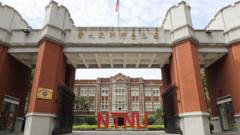In a powerful address, Amsterdam's Mayor Femke Halsema formally apologized for the city's collaboration with the Nazis, which led to the persecution and murder of over 60,000 Jewish residents during the Holocaust.
Amsterdam's Mayor Offers Apology for City's Role in Holocaust

Amsterdam's Mayor Offers Apology for City's Role in Holocaust
Mayor Femke Halsema acknowledges the city’s failure to protect Jewish residents during World War II, marking a significant moment of reflection on historical injustices.
In a historic move, Amsterdam's Mayor Femke Halsema issued a formal apology on Thursday for the city’s role in the Holocaust, highlighting a painful truth about the city’s past. The apology comes eighty years after the end of World War II, during a Holocaust commemoration held at the Hollandsche Schouwburg, a site that was transformed into a deportation center by the Nazis.
"Amsterdam's government failed to demonstrate the necessary courage and compassion when it mattered the most," Halsema stated, reflecting on the city’s morally deficient response to the persecution of its Jewish community. She noted that Amsterdam, which began the war with a Jewish population of 80,000, witnessed the deportation and killing of more than 60,000 of its Jewish citizens, whose lives were forever altered due to the city's complicity.
The Mayor delved into the alarming levels of collaboration that local officials had with the Nazi regime, from the cold bureaucratic decisions of city administrators to the active involvement of police officers in the deportations. "The city did not act heroically. It surrendered its moral obligation to protect its citizens, siding with the oppressors rather than standing with the oppressed," she explained.
This moment of reckoning has been emphasized not only as a necessary acknowledgment of past failures but also as a voice against the backdrop of rising antisemitism. "Antisemitism existed in our society before the Germans arrived, and it did not vanish after liberation," Halsema warned, suggesting that the moral lapses of the past should propel contemporary society to confront ongoing issues of discrimination and intolerance.
The apology serves as a reminder of the responsibilities civic leaders have in safeguarding human rights and the imperative to learn from history to prevent future atrocities. Halsema’s address calls upon the global community to reflect on similar issues today, showcasing both the weight of historical accountability and the need for continued vigilance against hate.


















